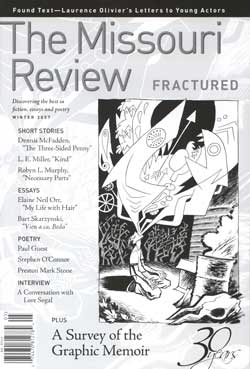Poetry | December 01, 2007
Poetry Feature: Preston Mark Stone
Preston Mark Stone
Featuring the poems:
- White Power [featured as a Poem of the Week April 16, 2008]
- Vigil of the Door
- Elephants of the Good Ship Memory
- Mortal Aphasia
- The Amazing Tomkins — Readings by Touch — No Appointment Necessary
White Power
To explain, for instance, this gas station clerk
who speaks to me in emphasized English, as though
my native language were something he heard in a war
movie, I have to go back to my neighbors in Bakersfield,
who listened to metal and shaved their heads
because their neighborhood was filling up with spicks,
niggers, fags and me. “Go back to the jungle!” they’d shout
at fruit pickers and drag queens, and I wondered what
imagined world they fought, what tropic in which
people swing from banana trees like crazed gay
Mexican lemurs. “Go back inside,” their mother told them
when she saw me watching from my porch, my face
brown with California sun, my eyes like slants of rice grain.
They vanished into their cluttered besieged house, the deadbolt
dropping as the door shut. To understand the deadbolt,
I have to go back to high school, to a boy who called me gook
every afternoon as he walked past me. His father was a veteran,
his brother a marine, my face the enemy’s face.
Every day for a year, he strolled by me and looked straight ahead
as he said gook in emphasized English, or chink, rice nigger,
slant-eye, Chinaman. The afternoon I caught him alone
and saw the swastika drawn on the back of his hand,
I punched him in the face until he curled up on the floor, arms
shielding his temples, and then I kicked him until
the police came. To explain why I was crying when my boot
met his belly, I have to go back to my first neighborhood
where, when I was eight, white people moved in.
Their sons were a little older, and loved to play cowboys
and Indians. They were the blond and fair frontiersmen,
the rest of us hordes of small dark Cherokee struck down
to make America. You two are Indian scouts, they said,
and you over there, you’re braves. Everyone was a cowboy
or an Indian, except for a little girl and me. We don’t need
no more Indians, they said. Too many
damn Indians already. You two, you’re horses.
We giggled until they pushed us to our hands and knees
and ordered us to eat grass. A year later, I would fight
one of them until he made me cry, but there on all fours,
I ate the grass. The little girl bawled, her mouth green
as money. Get along, they said. They drew
their pistols, and they rode us.
If you are a student, faculty member, or staff member at an institution whose library subscribes to Project Muse, you can read this piece and the full archives of the Missouri Review for free. Check this list to see if your library is a Project Muse subscriber.
Want to read more?
Subscribe TodaySEE THE ISSUE
SUGGESTED CONTENT

Poetry
Jan 08 2024
3 Poems by Scott Frey
Pink Feather Boa She is pinching my son’s small thumb and index finger around the petals of a buttercup, chanting She loves me; she loves me not,… read more

Poetry
Jan 08 2024
5 Poems by Virginia Konchan
Apostrophe My husband didn’t understand prayer. He said people who pray are deranged. Who do they think they’re talking to? Even with Bluetooth technology, do they not know how ridiculous… read more

Poetry
Jan 08 2024
5 Poems by Christine Marshall
Fall My father put his head through a wall. Leaves fell in red and orange puddles, the house dropped on the market. After-school sunlight dwindled, the solstice loomed. My child… read more

